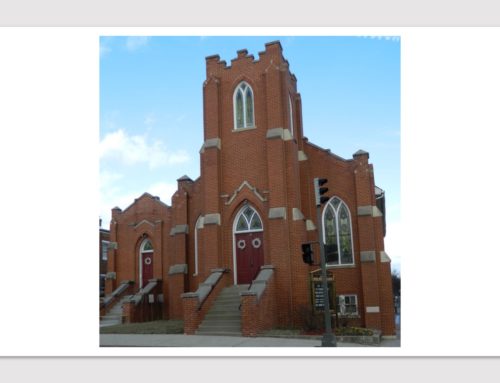Excerpt from Frederick News-Post:
When James Callear bought a house on West Third Street in May, he was familiar with the rules governing the Frederick Town Historic District.
What he didn’t realize, despite owning and renovating other properties in the historic district, was that utility boxes and meters cannot be on building facades, according to the city’s historic district guidelines.
Callear appeared on Thursday before the city Historic Preservation Commission to seek approval for the gas meter already affixed to the front of the 133 W. Third St. property.
The commission can approve meters and boxes on the front of a building if no other option is available, according to the city guidelines. But Callear said Washington Gas, the company providing the service, offered no alternative to placing the new meter on the front of the house.
His case demonstrates what has been a reoccurring problem in the downtown historic district: Utility companies affix meters to building fronts, putting homeowners in violation of city guidelines without their knowledge or control.
New meter boxes are typically installed for new properties or when a property is divided among multiple occupants. Upgrades to service may also require a new meter box.
At least two other cases involving meters placed on the front of historic downtown properties have come before the HPC in the last year, according to Matt Davis, the city’s division manager of comprehensive planning.
Those two — for meters at 118 E. South St. and 36 E. Third St. — both received commission approval, despite objections voiced by some commission members.
Commissioners voiced many of the same concerns Thursday.
“We seem to have no leeway about it,” Commissioner Stephen Parnes said. “The utility [companies] are basically dictating what happens in our historic district. We seem to have no control right now.”
“Clearly a discussion is needed,” agreed Commissioner Dan Lawton. “How many new houses are going to have these brand-new, large meters in front of them?”
Hoping to start that discussion, the commission denied Callear’s application by a 5-2 vote. Commissioners Parnes and Michael Simons cast the two votes in opposition to denying the application.
Callear said in an interview after the vote that he was disappointed by the vote and felt he was a victim of circumstance.
“It seems like we were just there at the right time,” Callear said.
As the conflicting standards continue to create problems, city employees are working to find alternatives.
Employees with the city planning and historic preservation departments recently met with Potomac Edison, the primary electric company for Frederick County, to discuss the problem, Davis said.
“It was a good first step,” Davis said of the meeting.
Todd Meyers, a spokesman for FirstEnergy Corp., which owns Potomac Edison, also said the meeting went well.
Company standards usually require the meter to be placed outside for safety and accessibility, he said. And while electricians often place the meter on the front of the building, it may also be placed on the side in certain cases, Meyers said.
In other cases, the meter could be placed in the basement, as long as there is a designated entrance for maintenance, repairs and periodic readings, according to Meyers.
“There’s a lot of ways to skin this cat,” he said. “We just need to be a part of the conversation a little sooner.”
The city historic district guidelines prohibit meters only on building facades. A meter on the side of the property would be allowed, Davis confirmed.
The city hopes to discuss similar alternatives with Washington Gas for gas meters, Davis said.
Until then, however, Callear faces the prospect of a notice of violation, and eventually, a fine, if he doesn’t remove the meter from the front of his downtown property. Asked if he planned to fight the commission’s decision to deny his application, he said he wanted to reserve comment.
He also said he may just continue using electric heat in the house instead of switching to a gas furnace as he originally planned.
But his case won’t be the last one that raises this problem, warned Artie Esworthy, who owns the property at 118 S. Market St. Although the commission in December 2015 approved his request for a front-facing meter, the process was long and difficult, he said.
“And there’s lots of other people on that street who are going to be going through the same thing very soon,” he said in a phone interview Tuesday. “I hope they come up with something.”



